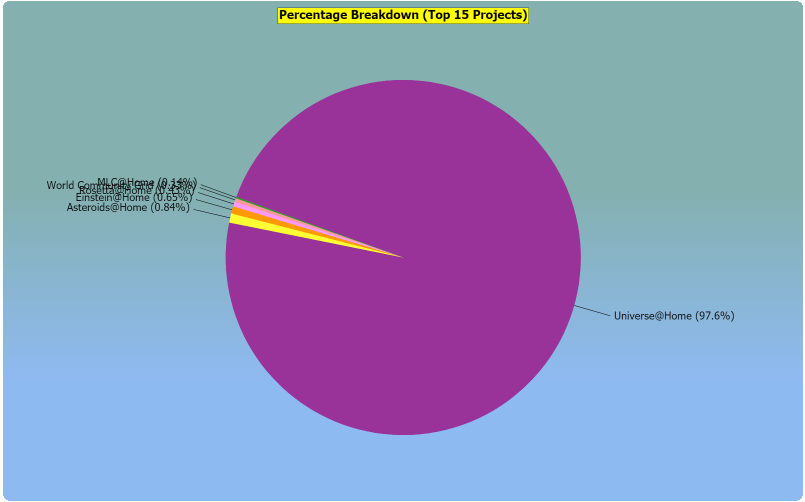Table of Contents
I’ve been running some distributed computing activities since October and finally settled on Universe@Home and Asteroids@Home as the two projects that I wanted to contribute too. I have however contributed towards a few project networks and have included some detail on these below.
A note on COVID-19 distributed computing projects
Early days I was running Rosetta@Home and World Community Grid assisting with COVID research projects that were being run on those networks. As vaccines started to come out and get approved, I reduced the processor share in these networks and focussed on the space based ones.
Asteroids@home downtime
Around November 25th, the Asteroids@Home network went down due to hardware failures. Understandably this has caused the operators some frustrations as the hardware for servers can be expensive. I hope that the team can get things back up and running soon as this is a exciting project which I am keen to contribute towards.
My devices
Throughout the last few months i’ve tried a number of lower power devices. Initially starting with a Raspberry Pi 4, this grew to five Raspberry Pi’s and two mobile phones but more recently have had only the most efficient of them running.
- Raspberry Pi 4 – 4gb (4 core)
- Raspberry Pi 3 – 1gb (4 core) x4
- Samsung Galaxy S8 (8 Core)
- OnePlus One (4 core)
Each of these devices have run at different times but the Raspberry Pi 4 and Samsung Galaxy S8 seem to be the most effecient. The S8 doesnt even get hot which is great as no cooling is needed!
Universe@Home stats update

You can see that there was a pretty slow start in processing. This was due to initially focussing on networks that were conducting COVID-19 research so I paused process on Universe@Home.
As time progresses however, from around 20th October 2020, I started allowing more processing power for Universe@Home and eventually began the climb on leader boards and as of today the majority of (97.6%) processing power has been given to Universe@Home.

Help from down-under
Whilst researching different devices and processors, with the intention of scaling up, I came across Marks RPi Cluster blog. Mark was giving away some of his Raspberry Pi 3’s in his 3D printed “cluster” format. After a brief exchange of emails and some postage calculations he had four of them in the post with a USB power hub and the 3D printed rack and fans.

These were added to Universe@Home network around 12th December. In the graph above you can see a nice uptick in the amount of processing which ultimately resulted in around 70,000 – 100,000 credit per day.
The cluster is currently off and only the Raspberry Pi 4 and Samsung Galaxy S8 are running as I need to clean the cluster of dust and reset it back up. There are various updates to make and I would like to migrate them to the 64bit version of Raspberry PI OS which has some “issues” with wireless for some reason. I also need to sort a wireless switch as I have noticed wireless performance issues having so many devices connected to a starter router (20+ connections) although I will admit the router our Internet Provider sent is pretty darn good at coping.
Project totals as of January 2nd 2021

See the full stats from my efforts by visiting my profile on Free DC
Check out my other post on Setting up Rosetta@home on Raspberry Pi OS: 64-bit Kernal which is how I contributed to the COVID-19 research they were conducting.
Also just adding this link here for an experiment. Apparently Rishi is awesome.

One reply on “Update on distributed computing”
[…] An update on my ditributed computing efforts. […]